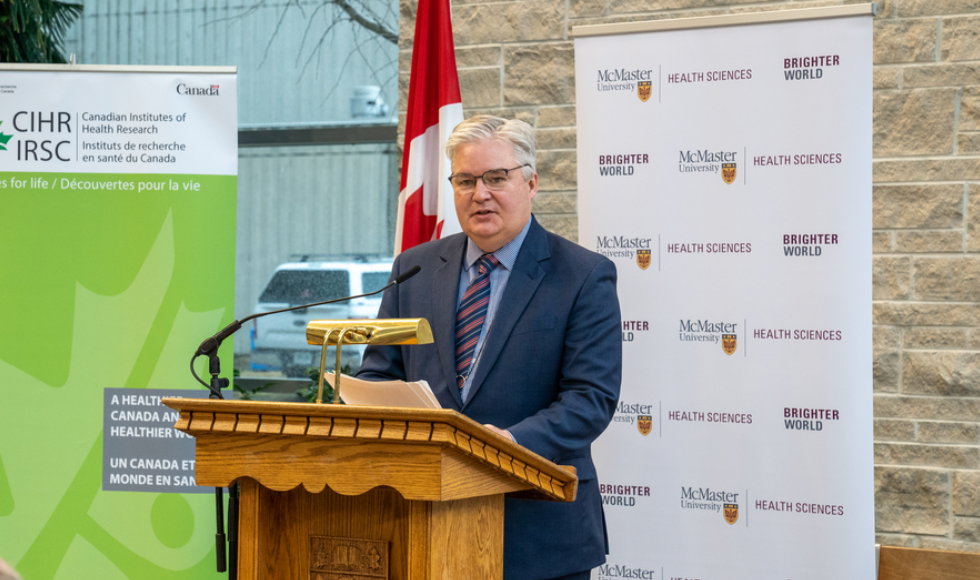Consortium aims to transform the landscape of Canada’s clinical trial system

PJ Devereaux, the lead of the Accelerating Clinical Trials (ACT) Canada Consortium, speaks at a Jan. 19 event at McMaster University where $39 million in federal funding through the Canadian Institutes of Health Research (CIHR) was announced. (Photo by Georgia Kirkos/McMaster University).
BY Maureen Lawlor
March 7, 2023
For years, the clinical trial system in Canada has functioned much like a long-distance runner — persevering despite roadblocks and bottlenecks in its way. But now it’s time for it to sprint, says PJ Devereaux.

The McMaster professor and cardiologist, who leads the Accelerating Clinical Trials (ACT) Canada Consortium, wants to help change the landscape of the clinical trial system in this country by finding efficiencies, building trial capacities and ensuring Canadians have equal access to participation in trials relevant to their health.
The consortium, which recently received $39 million in federal funding through the Canadian Institutes of Health Research (CIHR), is bringing together hundreds of researchers from 28 networks across the country, says Devereaux, who is also a senior scientist with the Population Health Research Institute (PHRI), which is hosting ACT.
“Across these networks we have groups that are cross-cutting enablers that are trying to address the issues that have slowed down trials in Canada and created bottlenecks,” says Devereaux. “We want to overcome that to make more efficient trials.”
Finding these efficiencies is important because of the huge role clinical trial systems play in decisions that ultimately benefit patients, he says.
“Most of the big advances that have really dramatically improved health care have come from evaluation in randomized control trials — those trials where patients get an experimental intervention or a control intervention, which can often be placebos,” says Devereaux. “They are far and away the gold standard of how we figure out what really works.”
Democratizing the system
Devereaux wants to see a democratization of the clinical trial system and says ACT will find ways to increase access for all Canadians.
“Whether you live in Nunavut, on Cape Breton Island or in downtown Toronto, you should have access to a clinical trial,” says Devereaux.
This expansion of access also means the health priorities of underrepresented groups will be addressed — in particular First Nations people, Métis and Inuit.
Indigenous researchers will lead the work of identifying the health priorities of these populations and funding will help conduct trials that are geared to a community’s needs, he says.
“It will be evidence that’s much more directly relevant to them, and they will hopefully be able to benefit a lot more from clinical trials happening in Canada,” says Devereaux.
“Crucial to advancing health:” @Machealthsci’s PJ Devereaux explains how a $39M investment through the @CIHR_IRSC Clinical Trials Fund will transform the landscape of clinical trials in Canada | @PHRIresearch ➡️ https://t.co/hunsRmGqfC pic.twitter.com/GAdQMpGKnD
— McMaster University (@McMasterU) January 20, 2023
Picking up speed
Learnings from the international response to the COVID-19 pandemic are serving as a path forward for the consortium, Devereaux says. He points to countries like the United Kingdom that were quick to react to the crisis.
“They had created this system where they had embedded study personnel in hospitals all over the country, not simply big academic medical schools,” says Devereaux.
While Canadian trials have made a remarkable impact in improving global health, there are areas of limitation that once addressed, would allow the system to pick up speed and efficiency.
The consortium is exploring bottlenecks created by the lack of a single ethics approval system at a national level, and the high cost of insurance to conduct international trials in other parts of the world.
Devereaux also wants to address the time lost in contract negotiations by creating master clinical trial agreements between the trial units and participating systems.
“When industry goes looking country by country to conduct studies, they look at the efficiency of that country,” says Devereaux. “So, it’s in our own interest, even economically, to make more efficient systems.”
A race to get answers
The federal government’s investment marks a welcome shift in Canada’s approach to clinical trials, Devereaux says.
“I’m glad people recognize that we had some systemic problems and it’s time to address those,” he says.
Should there be another pandemic in coming years, Devereaux hopes Canada will be a stronger contender in the race to find crucial answers.
“Despite having world leading clinical trials, Canada wasn’t a world leader when it came to the research that changed the way everyone managed COVID. We lagged way behind.
“People were dying fast, and we needed answers,” says Devereaux. “You needed to be able to sprint to get things done really efficiently because the world was depending on it.”


